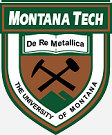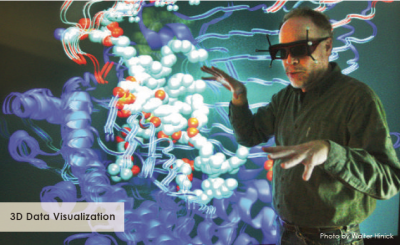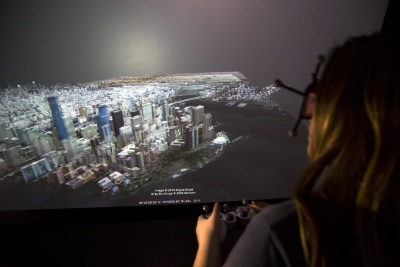Difference between revisions of "Cyberinfrastructure"
From Montana Tech High Performance Computing
(→HPC Architecture) |
|||
| Line 1: | Line 1: | ||
== HPC Architecture == | == HPC Architecture == | ||
| − | The Montana Tech HPC cluster contains 1 management node, 22 compute nodes, and a | + | The Montana Tech HPC cluster contains 1 management node, 22 compute nodes, and a total of 91 TB NFS storage systems. There is an additional computer server (copper). |
The compute nodes contain two 8-core Intel Xeon 2.2 GHz Processors (E5-2660) and either 64 or 128 GB of memory. Two of these nodes are [[GPU Nodes]] that contain three NVIDIA Tesla K20 accelerators and 128 GB of memory. Hyperthreading is enabled, so 704 threads can run simultaneously on just the XEON CPUs. A 40 Gbps InfiniBand (IB) network interconnects the nodes and the [[storage]] system. | The compute nodes contain two 8-core Intel Xeon 2.2 GHz Processors (E5-2660) and either 64 or 128 GB of memory. Two of these nodes are [[GPU Nodes]] that contain three NVIDIA Tesla K20 accelerators and 128 GB of memory. Hyperthreading is enabled, so 704 threads can run simultaneously on just the XEON CPUs. A 40 Gbps InfiniBand (IB) network interconnects the nodes and the [[storage]] system. | ||
| Line 100: | Line 100: | ||
</div> | </div> | ||
| + | <div class="row"> | ||
| + | <div class="large-3 columns"> | ||
| + | {| | ||
| + | |+<span style="color:#925223"> 4 Compute Nodes </span> | ||
| + | |- | ||
| + | | '''CPU'''|| Dual Xeon Platinum 8260 (2.40 GHz, 24-cores) | ||
| + | |- | ||
| + | | '''RAM'''|| 192 GB | ||
| + | |- | ||
| + | | '''Disk''' || 256 GB SSD | ||
| + | |- | ||
| + | | '''Nodes''' || TBD | ||
| + | |} | ||
| + | </div> | ||
| + | <div class="large-3 columns"> | ||
| + | |||
| + | </div> | ||
| + | <div class="large-3 columns"> | ||
| + | |||
| + | </div> | ||
| + | <div class="large-3 columns"> | ||
| + | |||
| + | </div> | ||
| + | |||
| + | </div> | ||
== 3D Visualization System == | == 3D Visualization System == | ||
Montana Tech is developing two 3D data visualization systems. Both systems provide an immersive visualization experience (aka virtual reality) through 3D stereoscopic imagery and user tracking systems. These systems allow scientists to directly interact with their data and helps them gain a better understanding of their data generated modeling on the HPC Cluster or collected in the field. Remote data visualization is possible by running [[VisIt]] from the cluster's login node. | Montana Tech is developing two 3D data visualization systems. Both systems provide an immersive visualization experience (aka virtual reality) through 3D stereoscopic imagery and user tracking systems. These systems allow scientists to directly interact with their data and helps them gain a better understanding of their data generated modeling on the HPC Cluster or collected in the field. Remote data visualization is possible by running [[VisIt]] from the cluster's login node. | ||
Revision as of 12:13, 20 August 2019
HPC Architecture
The Montana Tech HPC cluster contains 1 management node, 22 compute nodes, and a total of 91 TB NFS storage systems. There is an additional computer server (copper). The compute nodes contain two 8-core Intel Xeon 2.2 GHz Processors (E5-2660) and either 64 or 128 GB of memory. Two of these nodes are GPU Nodes that contain three NVIDIA Tesla K20 accelerators and 128 GB of memory. Hyperthreading is enabled, so 704 threads can run simultaneously on just the XEON CPUs. A 40 Gbps InfiniBand (IB) network interconnects the nodes and the storage system.
The system has a theoretical peak performance of 6.2 TFLOPS without the GPUs. The GPUs alone have a theoretical peak performance of 7.0 TFLOPS for double precision floating point operations. So the entire cluster has a theoretical peak performance of over 13 TFLOPS. The cluster has been benchmarked without the two GPU nodes at 4.6 TFLOPS using the LINPACK benchmark.
The operating system is Centos 7.3 and Penguin's Scyld ClusterWare is used to maintain and provision the compute nodes.
| CPU | Dual E5-2660 (2.2 GHz, 8-cores) |
| RAM | 64 GB |
| Disk | 450 GB |
| CPU | Dual E5-2643 v3 (3.4 GHz, 6-cores) |
| RAM | 128 GB |
| Disk | 1 TB |
| NFS storage | nfs0 - 25 TB |
| nfs1 - 66 TB | |
| Network | Ethernet |
| 40 Gbps InfiniBand |
| CPU | Dual E5-2660 (2.2 GHz, 8-cores) |
| RAM | 64 GB |
| Disk | 450 GB |
| Nodes | n0~n11, n13, n14 |
| CPU | Dual E5-2660 (2.2 GHz, 8-cores) |
| RAM | 128 GB |
| Disk | 450 GB |
| Nodes | n12, n15~n19 |
| CPU | Dual E5-2660 (2.2 GHz, 8-cores) |
| RAM | 128 GB |
| Disk | 450 GB |
| GPU | Three nVidia Tesla K20 |
| Nodes | n20, n21 |
| CPU | Dual Xeon Platinum 8260 (2.40 GHz, 24-cores) |
| RAM | 192 GB |
| Disk | 256 GB SSD |
| Nodes | TBD |
3D Visualization System
Montana Tech is developing two 3D data visualization systems. Both systems provide an immersive visualization experience (aka virtual reality) through 3D stereoscopic imagery and user tracking systems. These systems allow scientists to directly interact with their data and helps them gain a better understanding of their data generated modeling on the HPC Cluster or collected in the field. Remote data visualization is possible by running VisIt from the cluster's login node.
| CPU | Dual E5-2643 v4 (3.4 GHz, 6-cores) |
| RAM | 64 GB |
| Disk | 512 GB SSD + 1TB HD |
| GPU | Dual nVidia Quadro K5000 |
| OS | Windows 7 |
| Display | 108" 3D projector screen |
| Tracking | ART SMARTTRACK |



